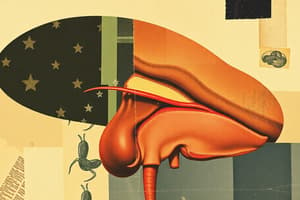Podcast
Questions and Answers
Which of the following glands/organs is not an endocrine gland?
Which of the following glands/organs is not an endocrine gland?
- Eccrine (correct)
- Hypophysis
- Parathyroid
- Pancreas
Endocrine glands are ductless.
Endocrine glands are ductless.
True (A)
What is the main function of hormones?
What is the main function of hormones?
Hormones act as chemical messengers, regulating various bodily processes, such as growth, metabolism, and reproduction.
What are the three general classes of hormones?
What are the three general classes of hormones?
Why are some hormones water-soluble, while others are lipid-soluble?
Why are some hormones water-soluble, while others are lipid-soluble?
What are the main types of hormone signaling?
What are the main types of hormone signaling?
What is the primary function of the endocrine system?
What is the primary function of the endocrine system?
Flashcards
Endocrinology
Endocrinology
Study of glands that produce hormones and their effects on organs
Endocrine System
Endocrine System
System of glands and cells that secrete hormones into the bloodstream
Hormones
Hormones
Chemical messengers secreted by endocrine glands
Target Cells
Target Cells
Signup and view all the flashcards
Endocrine Glands
Endocrine Glands
Signup and view all the flashcards
Endocrine cells
Endocrine cells
Signup and view all the flashcards
Hypophysis
Hypophysis
Signup and view all the flashcards
Parathyroid
Parathyroid
Signup and view all the flashcards
Pancreas
Pancreas
Signup and view all the flashcards
Insulin
Insulin
Signup and view all the flashcards
Glucagon
Glucagon
Signup and view all the flashcards
Somatostatin
Somatostatin
Signup and view all the flashcards
Adrenal Glands
Adrenal Glands
Signup and view all the flashcards
Gonads
Gonads
Signup and view all the flashcards
Thyroid
Thyroid
Signup and view all the flashcards
Hormone Receptors
Hormone Receptors
Signup and view all the flashcards
Cortisol
Cortisol
Signup and view all the flashcards
Oxytocin
Oxytocin
Signup and view all the flashcards
T3 and T4
T3 and T4
Signup and view all the flashcards
Eccrine Gland
Eccrine Gland
Signup and view all the flashcards
Exocrine Gland
Exocrine Gland
Signup and view all the flashcards
Mechanism of Hormone Secretion
Mechanism of Hormone Secretion
Signup and view all the flashcards
Growth, development, and maturation
Growth, development, and maturation
Signup and view all the flashcards
Systemic homeostasis
Systemic homeostasis
Signup and view all the flashcards
Key Endocrine Glands
Key Endocrine Glands
Signup and view all the flashcards
Hormone Characteristics
Hormone Characteristics
Signup and view all the flashcards
Clinical Endocrinology
Clinical Endocrinology
Signup and view all the flashcards
Endocrine System
Endocrine System
Signup and view all the flashcards
Endocrine Glands
Endocrine Glands
Signup and view all the flashcards
Endocrine Cells
Endocrine Cells
Signup and view all the flashcards
Hormones
Hormones
Signup and view all the flashcards
Target Cells
Target Cells
Signup and view all the flashcards
Hypophysis
Hypophysis
Signup and view all the flashcards
Parathyroid
Parathyroid
Signup and view all the flashcards
Pancreas
Pancreas
Signup and view all the flashcards
Insulin
Insulin
Signup and view all the flashcards
Glucagon
Glucagon
Signup and view all the flashcards
Somatostatin
Somatostatin
Signup and view all the flashcards
Adrenal Glands
Adrenal Glands
Signup and view all the flashcards
Gonads
Gonads
Signup and view all the flashcards
Thyroid
Thyroid
Signup and view all the flashcards
Mechanism of Hormone Secretion
Mechanism of Hormone Secretion
Signup and view all the flashcards
Growth, development, & maturation
Growth, development, & maturation
Signup and view all the flashcards
Systemic Homeostasis
Systemic Homeostasis
Signup and view all the flashcards
Key Endocrine Glands
Key Endocrine Glands
Signup and view all the flashcards
Hormone Characteristics
Hormone Characteristics
Signup and view all the flashcards
Hormone Receptors
Hormone Receptors
Signup and view all the flashcards
Cortisol
Cortisol
Signup and view all the flashcards
Oxytocin
Oxytocin
Signup and view all the flashcards
T3 and T4
T3 and T4
Signup and view all the flashcards
Eccrine Gland
Eccrine Gland
Signup and view all the flashcards
Exocrine Gland
Exocrine Gland
Signup and view all the flashcards
Clinical Significance
Clinical Significance
Signup and view all the flashcards
Test Procedures
Test Procedures
Signup and view all the flashcards
Study Notes
Clinical Endocrinology
- Study of glands producing hormones and their effects on organs
- Studies hormone synthesis and function in target organs
- Investigates pathology of endocrine glands
- Key target glands: gonads, thyroid, adrenal
Endocrine System Overview
- Composed of endocrine glands and specialized cells
- Endocrine cells secrete hormones (chemical messengers) into the bloodstream
- Hormones travel to target cells which have specific receptors
- Hormone action is specific due to receptor presence
Hormones
- Greek word "Hormon" meaning "to set into motion"
- Chemical messengers secreted by endocrine glands
- Act at distant sites from production
- Examples: cortisol, oxytocin, thyroid hormones (T3 and T4), insulin
- Produced by specific tissues/glands
- Specific transport to target cells
Hormone Types and Characteristics
- Peptide/Protein Hormones: Water-soluble, synthesized by anterior pituitary, placenta, pancreas, parathyroid, circulate freely
- Can be complete or inactive forms, some requiring activation
- Short half-life, regulated by analyte concentration
- Examples: PTH, Insulin, ACTH
- Glycoprotein Hormones: Similar structure to peptide hormones (alpha and beta subunits), regulated by hormone levels
- Examples: Luteinizing hormone, follicle-stimulating hormone
- Steroid Hormones: Derived from cholesterol, insoluble in water, require carriers
- Produced by adrenal glands, gonads, placenta
- Long half-life, regulated by negative feedback
- Examples: cortisol, aldosterone, testosterone, estrogen
Hormone Signaling
- Autocrine: Hormone acts on the same cell that produced it
- Paracrine: Hormone acts on nearby cells
- Intracrine: Hormone acts within the producing cell
Hormone Control
- Negative Feedback: Increased hormone levels trigger a response to decrease production (e.g., high hormone reduces further synthesis)
- Positive Feedback: Stimulus increases the response, leading to further increases (e.g., oxytocin release during childbirth)
Hormone Transport
- Lipid-soluble (e.g., steroids): Require transport proteins
- Water-soluble (e.g., peptides): Often circulate freely
Studying That Suits You
Use AI to generate personalized quizzes and flashcards to suit your learning preferences.




